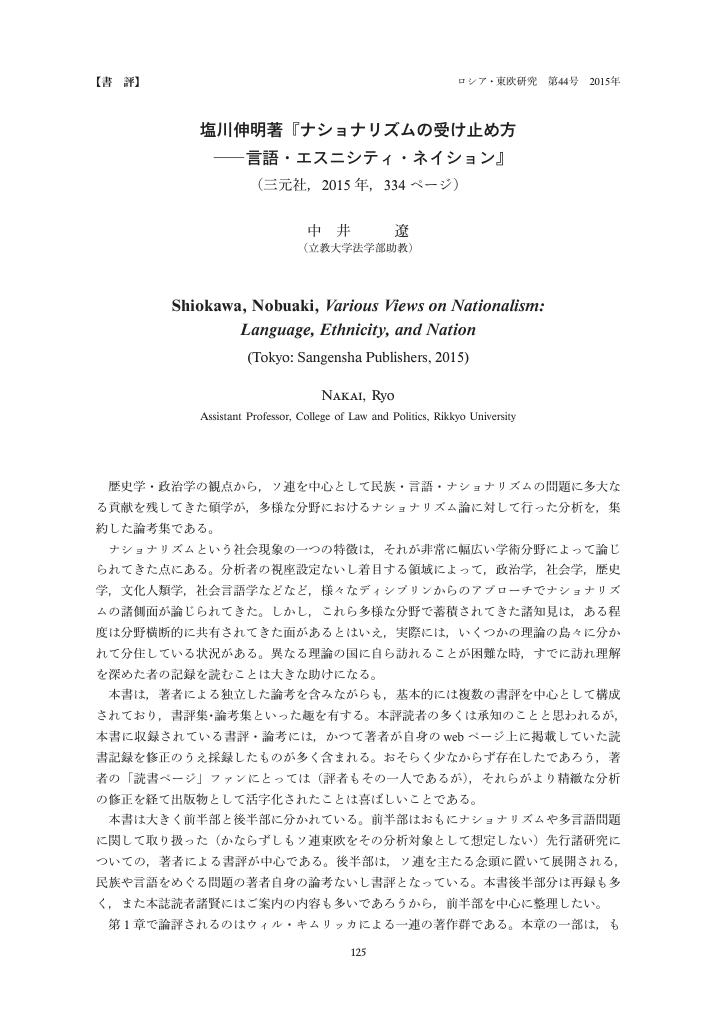27 0 0 0 OA 政治的左右と価値観の相関--欧州社会調査と世界価値観調査のシュワルツ価値理論設問を用いた国際比較
- 著者
- 中井 遼
- 出版者
- 北九州市立大学法学会
- 雑誌
- 北九州市立大学法政論集 (ISSN:13472631)
- 巻号頁・発行日
- vol.49, no.3・4合併号, pp.57-94, 2022-03
政治的空間における「左右」の意味内容は時代・地域の政治的文脈の影響を受ける一方,人間心理とも無関係ではない事が論じられてきた。本稿は文化的制約の少ないとされる価値理論であるシュワルツ価値体系を用い,広く先進諸国を対象に,左右イデオロギー自己位置と諸価値間の相関関係を探索的に分析した。発見は主に二点である。1)平等と伝統に価値を置く態度が相対的に多くの国で左右の位置づけと相関している。2)当該両相関が見られるのは西欧・北米に多く,一部の国では伝統等の保守性(と対極にある変化への開放性)のみが左右イデオロギー自己位置と相関しており,ポスト体制変動国ではそれらの相関がない,あるいは左右の意味が逆転している例もある。
27 0 0 0 OA インタビューで知る研究最前線 第6回 ソ連解体30年② 若手研究者の視座
- 著者
- 油本 真理 中井 遼 東島 雅昌 岡 奈津子
- 出版者
- 独立行政法人 日本貿易振興機構アジア経済研究所
- 雑誌
- アジア経済 (ISSN:00022942)
- 巻号頁・発行日
- vol.62, no.4, pp.79-101, 2021-12-15 (Released:2022-01-07)
10 0 0 0 OA フェルナンド・カザル=ベルトア「大統領直接選挙の危険性について」
- 著者
- 中井 遼
- 出版者
- 北九州市立大学法学会
- 雑誌
- 北九州市立大学法政論集 (ISSN:13472631)
- 巻号頁・発行日
- vol.49, no.1・2合併号, pp.141-155, 2021-10
7 0 0 0 OA 断片化するリトアニア政党システム
- 著者
- 中井 遼
- 出版者
- The Japanese Association for Russian and East European Studies
- 雑誌
- ロシア・東欧研究 (ISSN:13486497)
- 巻号頁・発行日
- vol.2009, no.38, pp.89-103, 2009 (Released:2011-10-14)
This article presents quantitative aspects of the party system in Lithuania and argues that Lithuania’s electoral institutions (mixed-member majoritarian system) define the quantitative features of its party system. There has been an ambivalent view of Lithuanian party politics in the literature. Some scholars argue that it is a highly fragile and volatile system, while others assert that it is stable. Several scholars have argued that its complexity could be explained as a result of intertemporal change. Adding to this debate, I argue that the differing evaluations of the Lithuanian party system is the result of analyses based on different measurement scores. The view that the system is unstable is supported by the multitude of political parties that seats in the parliament and the view that it is volatile is evidenced by the fact that newcomer parties easily win seats. On the other hand, effective party number index (known as the Laakso-Taagepera index) and the bipolar cabinet forming support the view that the system is stable. This article organizes and clears up various quantitative features of the party system of Lithuania and argues that its two main aspects—its instability (multitude of political parties) and its volatility (newcomer parties)—are prominent features of the political systems in other Central and East European countries. In order to explore the origins of these two prominent aspects of the Lithuanian party system, this article focuses on Lithuania’s electoral institutions. Socioeconomic and historical factors cannot account for the quantitative aspects of Lithuanian party politics. Lithuania has adopted the mixed-member majoritarian system as their electoral system, an institution that is very exceptional in the context of the Central and East European democracies. Referring to theoretical research in electoral studies, I argue that Lithuania’s adaptation of the mixed-member system is an explanatory variable in the determination of the quantitative aspects of Lithuania’s party system. This is because Lithuania’s adaptation of the mixed-member system, including single member district, do not promotes two party systems, rather fragmentizes the party system and foments personal voting. These effects are bolstered by contamination effects which occur in the mixed-member majoritarian system, seats distribution rule and the transitional fledgling Lithuanian party system. Observation clearly shows that single-member districts are responsible for the multitude of political parties, which are seated in the Lithuanian parliament. Representatives from about four to six parties are elected in proportional representation districts, but representatives from ten parties are elected in single member districts in Lithuania. Moreover, profiles of political elites who organize new political parties show that those who have been elected in single member districts are significantly involved in splitting from existing parties and forming new political parties. In addition, in single member districts it is easier for a member of the local elite possessing a political or economic power base to win an election than in another type of district. Lithuania’s party politics exhibit aspects of both stability and instability. However, the quantitative character and prominent features of the party system have been considerably defined by its mixed-member majoritarian electoral system.
- 著者
- 中井 遼
- 出版者
- 早稲田大学大学院政治学研究科
- 雑誌
- 早稲田政治公法研究 (ISSN:02862492)
- 巻号頁・発行日
- vol.94, pp.43-62, 2010-08-20
5 0 0 0 OA 何を分析に加えるべきか : 浜中評・小林評へのリプライ
- 著者
- 中井 遼
- 出版者
- 独立行政法人 日本貿易振興機構アジア経済研究所
- 雑誌
- アジア経済 (ISSN:00022942)
- 巻号頁・発行日
- vol.59, no.4, pp.89-91, 2018-12-15 (Released:2019-03-25)
- 参考文献数
- 3
1 0 0 0 OA Expanding and Evolving Baltic Studies in Japan: Content Analysis of Bibliographical Databases
- 著者
- 中井 遼
- 出版者
- 北九州市立大学法学会
- 雑誌
- 北九州市立大学法政論集 (ISSN:13472631)
- 巻号頁・発行日
- vol.50, no.1・2合併号, pp.137-153, 2022-10
This work investigates the development of Baltic studies in Japan and its changes and evolutions, focusing on quantitative data from bibliographic databases, including some anecdotal episodes.
- 著者
- 中井 遼
- 出版者
- ロシア・東欧学会
- 雑誌
- ロシア・東欧研究 (ISSN:13486497)
- 巻号頁・発行日
- vol.2015, no.44, pp.125-127, 2015 (Released:2017-08-18)
米欧アジアにおけるプライマリーの実証的分析を行う本研究は、地域・手法を重層的に横 断した研究体制に基づいて、4カ年 計画で議員サー ベイを含むデータ収集、量的・質的な比較分析を行い、引き出した仮説をサーベイ実験で検証する。データベー ス・成果は国内外の 研究者に 公開して、プライマリー関連研究の進展に貢献する企図である。進捗管理と予測できない事態へ の対応も含めて、メンバー間での研究会を実 施する。計画2年目に当たる2019年度は、初年度に整理した海外調査のデータとそれを基にした分析をまとめて、英語または邦語で論文を執筆した。代表者及び分担者は、国内外の学術誌における査読論文(Party Politics等)、国内外の学会発表等(Council for European Studies, Midwest Political Science Association , International Political Science Associationなど)を通じて、積極的に成果を発信した。また2019年度は在外研究の研究資金処理の関係で分担者を外れざるを得なかった菊池氏についても、研究上の連携を維持し、関連論文の執筆及び次年度のサーベイに向けた研究を実施した。データ収集・調査については、各自の担当地域について、関連資金も利用しながら調査を行った。研究打ち合わせは、国内学会の開催に合わせて随時実施していたが、年度末に予定してた成果取りまとめと論文集作成のための研究会、その前のいくつかの海外調査については、新型コロナウィルスの感染拡大に伴う移動制限によって断念せざるを得なかった。
1 0 0 0 IR 欧州におけるポスト難民危機期の排外意識分析 右翼政党支持・反移民態度・反欧州統合
- 著者
- 中井 遼
- 出版者
- 北九州市立大学国際教育交流センター
- 雑誌
- 北九州市立大学国際論集 = CIEE journal, the University of Kitakyushu (ISSN:13481851)
- 巻号頁・発行日
- no.18, pp.43-72, 2020-03
欧州における右翼政党台頭や反移民態度の問題は2010年代後半の欧州政治の一つの重大トピックとなっている。右翼政党支持や反移民態度の規程要因については,これまでも多くの先行研究が知見を蓄積してきた。しかし,欧州難民危機以降の社会状況でも同様の要因が有効であるかは明らかではない。2019年に二つの欧州大の世論調査の先行公開データがリリースされ(特に欧州価値観調査[EVS]はおよそ10年ぶりの更新),2010年代後半のデータによる分析が可能となった。そこで本稿ではこれら2つの世論調査先行リリースデータを用い,近年の欧州における右翼政党支持や反移民態度などの排外主義態度の規定要因を分析する。分析結果は,主に次の3点を明らかにした。1)右翼政党支持は,移民による自国文化・治安への侵蝕といった社会文化的態度と欧州統合への反感によって規定されており,ジャーナリスティックに論じられがちな社会経済的弱者による反発という見解に実証的根拠は存在しない;2)移民による自国文化・治安への侵蝕の懸念は,欧州統合への反発と学歴が主たる規定要因となっており,国によっては自国政治への不信・不満が追加要因となっている;3)右翼政党支持・移民文化侵蝕懸念・欧州統合反対のトライアングル構造は西欧主要国においては盤石なものの,必ずしも欧州全体で支配的なパターンではない。これらの結果は,ポスト難民危機期の欧州における排外主義分析にリテラチュアが有効であること,ならびに,社会経済的な「上か下か」のみに着目していては欧州における排外主義台頭の背景を分析できずより多様な政治意識への考慮が必要であることを示す。その際,さらに多様で包括的な排外主義構造の理解のために,少数の西欧主要国にとどまらない分析・研究が必要であることが示唆される。
1 0 0 0 IR 少数民族政党の議席獲得の成否--アクター中心アプローチによる理論的再検討
- 著者
- 中井 遼
- 出版者
- 早稲田大学大学院政治学研究科
- 雑誌
- 早稲田政治公法研究 (ISSN:02862492)
- 巻号頁・発行日
- no.90, pp.31-43, 2009

